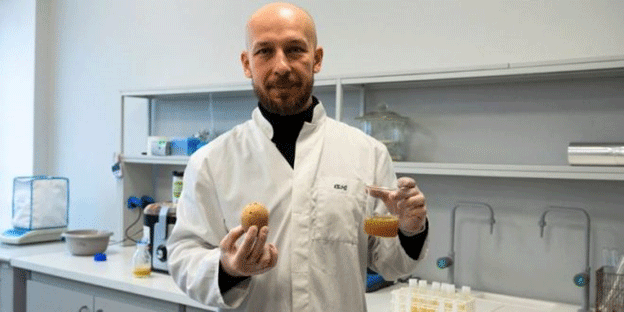Researchers from the Poznań University of Life Sciences have made a significant breakthrough by identifying health-promoting compounds in ordinary potato juice. These compounds, found in a product traditionally used in natural remedies, have the potential to aid in the treatment of cancer, reduce inflammation in intestinal diseases, and even be used in creating meat substitutes. The study, led by Dr. Przemysław Kowalczewski, has sparked interest in the potential medical and ecological benefits of potato juice.
Healing Properties of Potato Juice
In traditional medicine, potato juice has been known in German-speaking countries for its use in treating gastrointestinal disorders, particularly for ulcers. Now, scientific studies confirm that it offers much more. Dr. Kowalczewski’s research, which earned the City of Poznań Award in 2017, highlights the juice’s role in reducing inflammation in patients with inflammatory bowel disease (IBD), including Crohn’s disease and ulcerative colitis. The findings were supported by in vitro and in vivo studies conducted with the Medical University of Warsaw and tested on animal models and human subjects.
Potato juice is composed of 95% water, while the remaining 5% contains valuable nutrients, such as mineral compounds, vitamins, phenolic compounds, glycoalkaloids, and high-quality proteins. When consumed, the juice has been shown to decrease C-reactive protein (CRP) levels, a marker for inflammation, in IBD patients, proving its therapeutic potential.
Aiding the Fight Against Cancer
The research also revealed that compounds in potato juice might have cytotoxic effects on gastrointestinal cancer cells. While the substances target cancer cells, they have a gentler impact on healthy intestinal cells. This discovery suggests that potato juice could be used alongside chemotherapy to reduce its adverse effects, offering a natural way to lessen discomfort during treatment.
However, the researchers caution against viewing potato juice as a stand-alone cancer cure. For effective consumption, the juice should be filtered to remove raw starch, which the human body cannot digest, leaving behind a clear, nutrient-rich liquid.
Meat Substitutes: The Potato Sausage
In addition to its medicinal properties, potato juice is being used in the development of meat substitutes. Dr. Kowalczewski’s team has successfully created potato-based sausage, gyros, and burger alternatives. These plant-based products aim to offer a healthier and more nutritious option compared to existing vegan alternatives, many of which lack the nutritional value of meat.
While potato protein has a high amino acid profile, it presents challenges in food production due to its potato-like smell and gray color. To overcome these issues, the team mixed potato proteins with other ingredients, resulting in a nutritious product that mimics the taste and texture of traditional meat. These meatless products are also environmentally friendly, contributing to the growing demand for sustainable and healthier food options.
The research from Poznań University shows that potato juice is more than just a byproduct—it is a powerhouse of nutrients with the potential to transform food and medical industries. From reducing inflammation in gut diseases to offering promising anti-cancer properties and forming the basis for plant-based meat substitutes, the versatility of potato juice is truly remarkable. As scientists continue to explore its applications, potato juice may soon play a key role in improving health and sustainability in food production.







